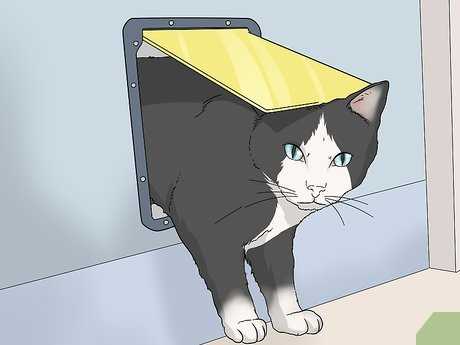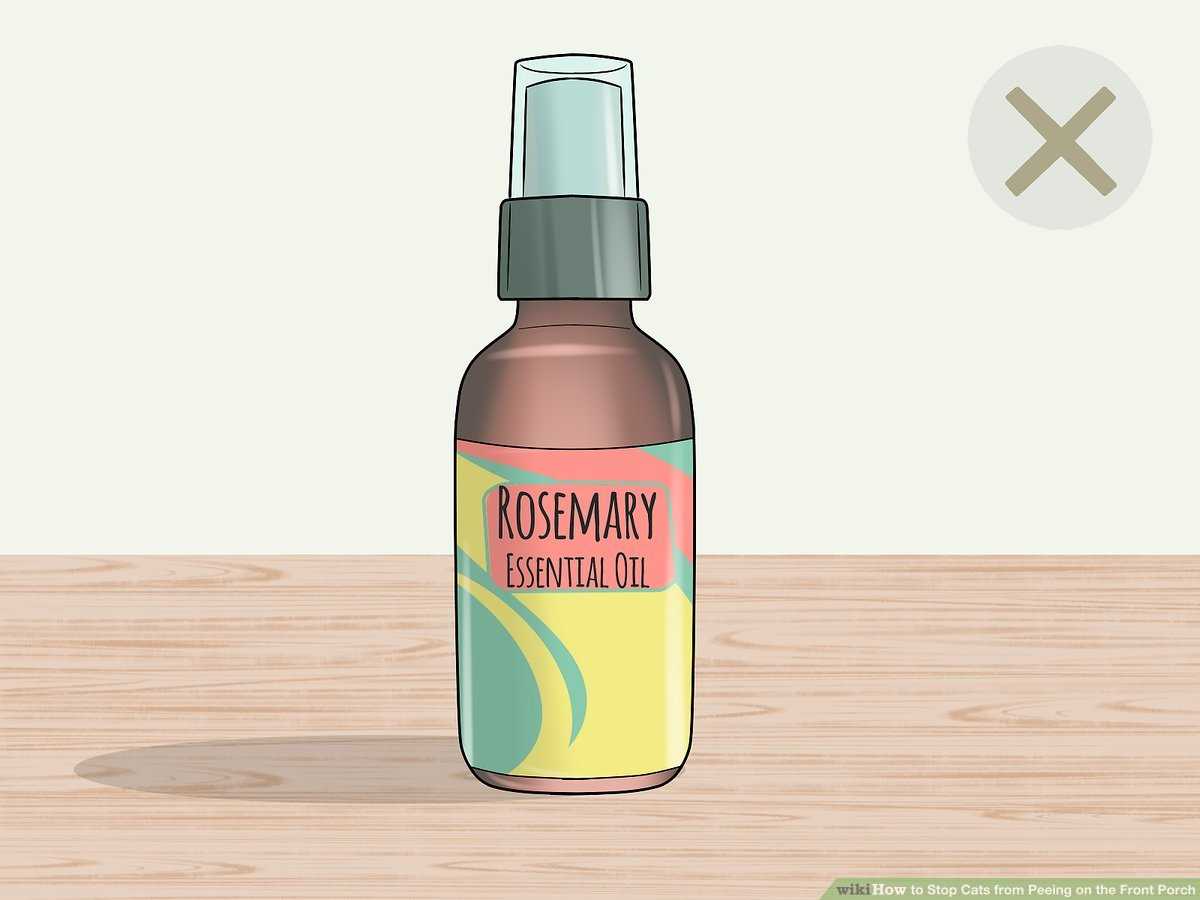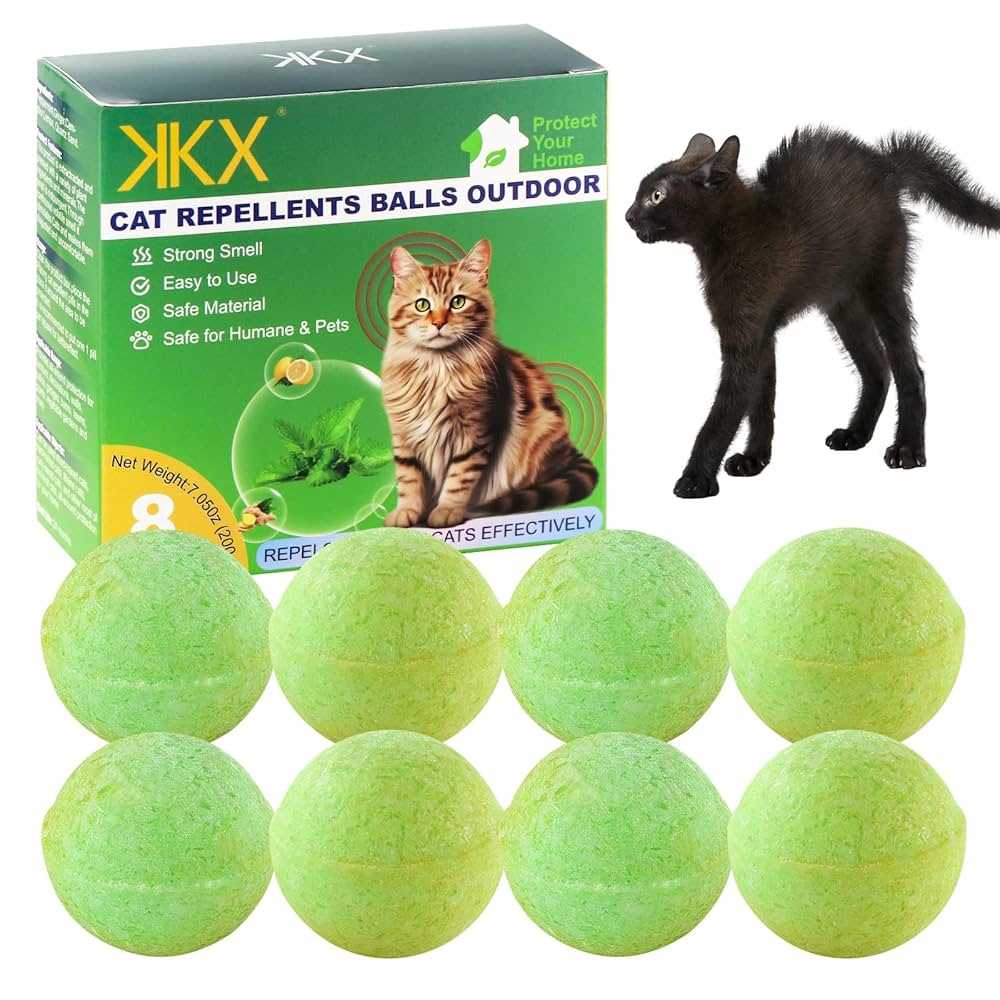Using citrus scents can be an effective method. Cats typically dislike the smell of oranges and lemons. Spraying citrus-based solutions around the area can deter them from approaching.
Consider placing physical barriers. Installing mesh or lattice can create an unwelcoming environment for any curious visitors. Ensure that these barriers are tall enough to prevent jumping over.
Introducing motion-activated devices may also help. Sprinklers or noise-making gadgets can startle and discourage any intruders. These devices activate upon detecting movement, providing a surprise that many felines prefer to avoid.
Utilizing natural repellents is another approach. Certain plants, like lavender or rosemary, are known to repel cats. Planting these around the perimeter can create a natural deterrent while enhancing the outdoor aesthetic.
Creating a designated area for them away from your space can redirect their behavior. Setting up a small corner with cat-friendly items, like a scratching post or a cozy bed, can attract them to a preferred spot.
Preventing Unwanted Marking on My Space

Using citrus scents can deter intruders effectively. I recommend placing orange or lemon peels around the area. The strong smell is off-putting to many felines. Additionally, consider commercial repellents that contain natural ingredients like peppermint oil, which can also be effective.
Creating a Deterrent Environment

Establishing barriers can discourage unwanted visitors. Installing tall fences or using lattice panels can create an unwelcoming environment. Additionally, placing physical objects like rocks or decorative garden items can make the area less appealing for wandering visitors.
Offering Alternative Spaces

Providing a designated area away from my home can redirect attention. Setting up a cozy shelter with bedding and food can attract them to a more suitable location. This strategy can help minimize their presence near my living space.
Using Natural Repellents to Deter Unwanted Felines

One effective way to discourage unwanted visitors is by utilizing natural repellents. Here are some options that I’ve found useful:
- Citrus Peels: The scent of citrus is a strong deterrent. Scatter orange or lemon peels around the area. It’s a simple and pleasant solution.
- Vinegar: A mixture of water and vinegar can be sprayed on surfaces. The strong smell is unappealing to many animals.
- Cayenne Pepper: Sprinkling cayenne pepper around the vicinity can create a spicy barrier. Be cautious about wind direction, as it may affect nearby plants.
- Essential Oils: Certain oils like lavender, peppermint, and eucalyptus can repel. Mix a few drops with water and spray it around.
- Coffee Grounds: Leftover coffee grounds not only repel but also enrich the soil if used in gardens. Spread them generously for a double benefit.
Combine these methods for a more robust effect. Additionally, ensure that food sources are secured to avoid attracting animals. For instance, check out best dry food for sphynx cats to find options that don’t leave leftovers.
Implementing these natural repellents can create a more pleasant environment without harsh chemicals. For those with pet food outside, consider how to keep birds away from cat food to minimize attracting any unwanted guests.
Creating Physical Barriers to Prevent Access
Install a sturdy fence around the area, ensuring it’s at least 6 feet tall to deter jumping. Use materials like chain-link or wooden panels, and bury the bottom a few inches underground to prevent digging.
Consider adding a gate that can be locked. This prevents unwanted visitors while allowing easy access for myself and my humans.
Plant dense shrubs or thorny bushes near the porch. These natural barriers can discourage unwelcome visitors from approaching.
Place raised planters filled with prickly plants or decorative rocks along the edges of the porch. This creates an unwelcoming terrain for those looking to enter.
Install motion-activated sprinklers. The sudden burst of water can startle and repel any intruders that approach too closely.
Utilize outdoor furniture strategically. Arranging items like chairs or tables can create obstacles, making it difficult for intruders to navigate the area.
Seal any gaps or openings under the porch. This prevents access to hiding spots and makes the area less appealing for unwanted guests.
Using citrus scents can be an effective method. Cats typically dislike the smell of oranges and lemons. Spraying citrus-based solutions around the area can deter them from approaching.
Consider placing physical barriers. Installing mesh or lattice can create an unwelcoming environment for any curious visitors. Ensure that these barriers are tall enough to prevent jumping over.
Introducing motion-activated devices may also help. Sprinklers or noise-making gadgets can startle and discourage any intruders. These devices activate upon detecting movement, providing a surprise that many felines prefer to avoid.
Utilizing natural repellents is another approach. Certain plants, like lavender or rosemary, are known to repel cats. Planting these around the perimeter can create a natural deterrent while enhancing the outdoor aesthetic.
Creating a designated area for them away from your space can redirect their behavior. Setting up a small corner with cat-friendly items, like a scratching post or a cozy bed, can attract them to a preferred spot.
Preventing Unwanted Marking on My Space

Using citrus scents can deter intruders effectively. I recommend placing orange or lemon peels around the area. The strong smell is off-putting to many felines. Additionally, consider commercial repellents that contain natural ingredients like peppermint oil, which can also be effective.
Creating a Deterrent Environment

Establishing barriers can discourage unwanted visitors. Installing tall fences or using lattice panels can create an unwelcoming environment. Additionally, placing physical objects like rocks or decorative garden items can make the area less appealing for wandering visitors.
Offering Alternative Spaces

Providing a designated area away from my home can redirect attention. Setting up a cozy shelter with bedding and food can attract them to a more suitable location. This strategy can help minimize their presence near my living space.
Using Natural Repellents to Deter Unwanted Felines

One effective way to discourage unwanted visitors is by utilizing natural repellents. Here are some options that I’ve found useful:
- Citrus Peels: The scent of citrus is a strong deterrent. Scatter orange or lemon peels around the area. It’s a simple and pleasant solution.
- Vinegar: A mixture of water and vinegar can be sprayed on surfaces. The strong smell is unappealing to many animals.
- Cayenne Pepper: Sprinkling cayenne pepper around the vicinity can create a spicy barrier. Be cautious about wind direction, as it may affect nearby plants.
- Essential Oils: Certain oils like lavender, peppermint, and eucalyptus can repel. Mix a few drops with water and spray it around.
- Coffee Grounds: Leftover coffee grounds not only repel but also enrich the soil if used in gardens. Spread them generously for a double benefit.
Combine these methods for a more robust effect. Additionally, ensure that food sources are secured to avoid attracting animals. For instance, check out best dry food for sphynx cats to find options that don’t leave leftovers.
Implementing these natural repellents can create a more pleasant environment without harsh chemicals. For those with pet food outside, consider how to keep birds away from cat food to minimize attracting any unwanted guests.
Creating Physical Barriers to Prevent Access
Install a sturdy fence around the area, ensuring it’s at least 6 feet tall to deter jumping. Use materials like chain-link or wooden panels, and bury the bottom a few inches underground to prevent digging.
Consider adding a gate that can be locked. This prevents unwanted visitors while allowing easy access for myself and my humans.
Plant dense shrubs or thorny bushes near the porch. These natural barriers can discourage unwelcome visitors from approaching.
Place raised planters filled with prickly plants or decorative rocks along the edges of the porch. This creates an unwelcoming terrain for those looking to enter.
Install motion-activated sprinklers. The sudden burst of water can startle and repel any intruders that approach too closely.
Utilize outdoor furniture strategically. Arranging items like chairs or tables can create obstacles, making it difficult for intruders to navigate the area.
Seal any gaps or openings under the porch. This prevents access to hiding spots and makes the area less appealing for unwanted guests.
Using citrus scents can be an effective method. Cats typically dislike the smell of oranges and lemons. Spraying citrus-based solutions around the area can deter them from approaching.
Consider placing physical barriers. Installing mesh or lattice can create an unwelcoming environment for any curious visitors. Ensure that these barriers are tall enough to prevent jumping over.
Introducing motion-activated devices may also help. Sprinklers or noise-making gadgets can startle and discourage any intruders. These devices activate upon detecting movement, providing a surprise that many felines prefer to avoid.
Utilizing natural repellents is another approach. Certain plants, like lavender or rosemary, are known to repel cats. Planting these around the perimeter can create a natural deterrent while enhancing the outdoor aesthetic.
Creating a designated area for them away from your space can redirect their behavior. Setting up a small corner with cat-friendly items, like a scratching post or a cozy bed, can attract them to a preferred spot.
Preventing Unwanted Marking on My Space

Using citrus scents can deter intruders effectively. I recommend placing orange or lemon peels around the area. The strong smell is off-putting to many felines. Additionally, consider commercial repellents that contain natural ingredients like peppermint oil, which can also be effective.
Creating a Deterrent Environment

Establishing barriers can discourage unwanted visitors. Installing tall fences or using lattice panels can create an unwelcoming environment. Additionally, placing physical objects like rocks or decorative garden items can make the area less appealing for wandering visitors.
Offering Alternative Spaces

Providing a designated area away from my home can redirect attention. Setting up a cozy shelter with bedding and food can attract them to a more suitable location. This strategy can help minimize their presence near my living space.
Using Natural Repellents to Deter Unwanted Felines

One effective way to discourage unwanted visitors is by utilizing natural repellents. Here are some options that I’ve found useful:
- Citrus Peels: The scent of citrus is a strong deterrent. Scatter orange or lemon peels around the area. It’s a simple and pleasant solution.
- Vinegar: A mixture of water and vinegar can be sprayed on surfaces. The strong smell is unappealing to many animals.
- Cayenne Pepper: Sprinkling cayenne pepper around the vicinity can create a spicy barrier. Be cautious about wind direction, as it may affect nearby plants.
- Essential Oils: Certain oils like lavender, peppermint, and eucalyptus can repel. Mix a few drops with water and spray it around.
- Coffee Grounds: Leftover coffee grounds not only repel but also enrich the soil if used in gardens. Spread them generously for a double benefit.
Combine these methods for a more robust effect. Additionally, ensure that food sources are secured to avoid attracting animals. For instance, check out best dry food for sphynx cats to find options that don’t leave leftovers.
Implementing these natural repellents can create a more pleasant environment without harsh chemicals. For those with pet food outside, consider how to keep birds away from cat food to minimize attracting any unwanted guests.
Creating Physical Barriers to Prevent Access
Install a sturdy fence around the area, ensuring it’s at least 6 feet tall to deter jumping. Use materials like chain-link or wooden panels, and bury the bottom a few inches underground to prevent digging.
Consider adding a gate that can be locked. This prevents unwanted visitors while allowing easy access for myself and my humans.
Plant dense shrubs or thorny bushes near the porch. These natural barriers can discourage unwelcome visitors from approaching.
Place raised planters filled with prickly plants or decorative rocks along the edges of the porch. This creates an unwelcoming terrain for those looking to enter.
Install motion-activated sprinklers. The sudden burst of water can startle and repel any intruders that approach too closely.
Utilize outdoor furniture strategically. Arranging items like chairs or tables can create obstacles, making it difficult for intruders to navigate the area.
Seal any gaps or openings under the porch. This prevents access to hiding spots and makes the area less appealing for unwanted guests.






